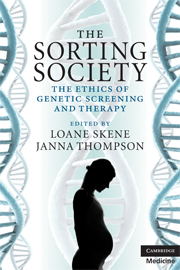Book contents
- Frontmatter
- Contents
- List of contributors
- Preface
- 1 Introduction
- 2 Genetic testing, an informed choice
- 3 Sex selection: sorting sperm as a gateway to the sorting society?
- 4 Cloning to avoid genetic disease
- 5 Procreative Beneficence: reasons to not have disabled children
- 6 Reprogenetic technologies: balancing parental procreative autonomy and social equity and justice
- 7 Genetic technology and intergenerational justice
- 8 Genetic preselection and the moral equality of individuals
- 9 Genes, identity and the ‘expressivist critique’
- 10 Overstating the biological: geneticism and essentialism in social cloning and social sex selection
- 11 The sorting society: a legal perspective
- Index
6 - Reprogenetic technologies: balancing parental procreative autonomy and social equity and justice
Published online by Cambridge University Press: 16 September 2009
- Frontmatter
- Contents
- List of contributors
- Preface
- 1 Introduction
- 2 Genetic testing, an informed choice
- 3 Sex selection: sorting sperm as a gateway to the sorting society?
- 4 Cloning to avoid genetic disease
- 5 Procreative Beneficence: reasons to not have disabled children
- 6 Reprogenetic technologies: balancing parental procreative autonomy and social equity and justice
- 7 Genetic technology and intergenerational justice
- 8 Genetic preselection and the moral equality of individuals
- 9 Genes, identity and the ‘expressivist critique’
- 10 Overstating the biological: geneticism and essentialism in social cloning and social sex selection
- 11 The sorting society: a legal perspective
- Index
Summary
Introduction
In-vitro fertilization techniques and pre-implantation genetic diagnosis (PGD) currently allow parents to select an embryo for implantation in a woman's womb to avoid the resulting offspring suffering from, or being a carrier of, an inherited genetic disorder. In the future, it may be possible to screen and select embryos for non-disease genetic traits or predispositions. As well, some moral philosophers anticipate technologies that will enable parents to create embryos with a reduced susceptibility to disease as well as with valued non-disease characteristics such as height, intelligence, heterosexuality, impulse control, resistance to alcoholism, maternal behaviour, extraversion and athleticism, to name a few. In this chapter, I will refer to all such reproductive and genetic selection techniques as ‘reprogenetic technologies’.
If science does deliver the knowledge necessary for parents to create embryos free from disease and with desired non-disease traits and predispositions, questions arise as to whether parents would be morally obligated to use such technologies or, if no such obligations exist, whether it might still be morally permissible for them to choose to use them. Even if obligations can be founded or parental choice justified, we must ask whether society has good reason to encourage or allow untrammelled parents to use the technologies or whether some restrictions or even prohibitions may be justified.
To explore these questions, I will examine two claims.
- Type
- Chapter
- Information
- The Sorting SocietyThe Ethics of Genetic Screening and Therapy, pp. 69 - 84Publisher: Cambridge University PressPrint publication year: 2008

